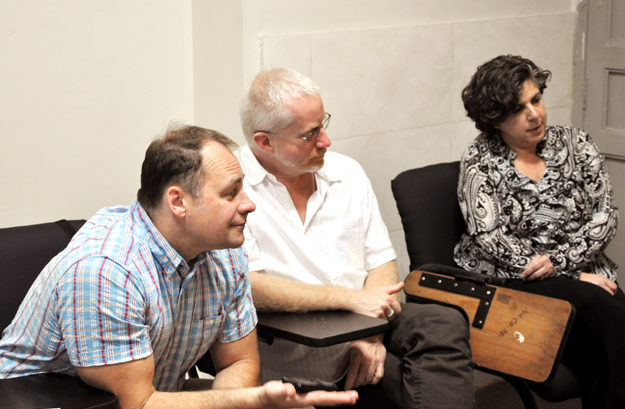
Arieb Azhar, Noori, Zeb and Haniya and Ali Gul Pir. All these musicians have one thing in common: they have all participated in the cultural program called Center Stage, a project funded by the US State department in collaboration with the New England Foundation.
The project allows artists from around the globe to perform, interact and exchange ideas and their music with others, along with a countrywide tour of the US. Members of Center Stage shed some light on what the programme is all about.
“This is more about bringing artists to the US and allowing them to experience the American culture,” says Center Stage General Manager Deirdre Valente. “But the purpose is also to have Americans interact with these international artists directly.” Through this project, stereotypes and preconceived notions people have in mind about other nations, may be dispelled.

The Center Stage team has assisted artists such as Arieb Azhar, Noori, Zeb and Haniya and Ali Gul Pir in their music careers. PHOTO: PUBLICITY
For Pakistani artists specifically, it’s never really plain sailing when it comes to organising large-scale month-long tours or even just finding the right people to organise it for them. With Valente’s aid and years of experience, things seemed to have gotten simpler.
“Even though the US government is supporting this [cause], these artists were already in the market with all other artists – they have worked under professional circumstances and venues,” adds Valente, who is also the Vice President of Lisa Booth Management.
This project has heavily benefitted Pakistani musicians and has opened several doors for them. Arieb Azhar, for instance, released a video of his performance in Chicago and Noori was introduced to a couple of music producers in New York, and one ended up coming to Pakistan to discuss possible ventures with the band.
“Nowadays, more people are interested in world music which has multiple musical influences,” says Brian Jose, Executive Director of the Fine Arts programme at Saint John’s University. “This globalisation is helpful for my audiences. There is some familiarity but there are also things people are not familiar with.”
Jose has worked predominantly with Haitian artists in the past and feels such collaborations lead to more creativity. Apart from the collaborations between international and American artists, this project also gives space for experimentation with various techniques and styles – conventional and unconventional – which he feels is much needed.
Director of Arts Programming in Connecticut College, Robert Richter, who has been a part of this project, feels Center Stage has helped bridge the gap between Pakistan and the US due to prevailing political tensions. “We are not so different – I feel there are so many more similarities than differences in people and art [from different countries],” says Richter. “I feel the programme has really allowed us to connect with people as human beings and ultimately, that is what’s most important.”
Center Stage has an open-nomination process which occurs every year in Fall. The process for Center Stage 2014 has already begun and tours are taking place simultaneously. Artists can nominate themselves, as well as nominate their peers.
Published in The Express Tribune, April 11th, 2013.
Like Life & Style on Facebook for the latest in fashion, gossip and entertainment.